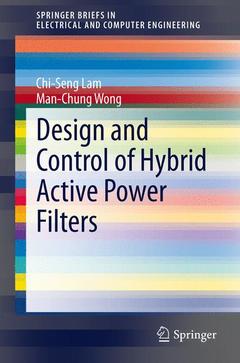Description
Design and Control of Hybrid Active Power Filters, 2014
SpringerBriefs in Electrical and Computer Engineering Series
Authors: Lam Chi-Seng, Wong Man-Chung
Language: English
Subjects for Design and Control of Hybrid Active Power Filters:
Approximative price 52.74 €
In Print (Delivery period: 15 days).
Add to cart158 p. · 15.5x23.5 cm · Paperback
Description
/li>Contents
/li>Comment
/li>
Design and Control of Hybrid Active Power Filters presents an overview of the current quality problems and their compensators. To get a balance between the system cost and performance, hybrid active power filters (HAPFs) are valuable. The book presents the coverage of resonance phenomena prevention capability, filtering performance and system robustness analysis of HAPF; nonlinear inverter current slope characteristics and their linear operation region requirement analysis of the hysteresis PWM for the HAPF; minimum inverter capacity design procedure of HAPF, adaptive dc-link voltage controller for the HAPF and the real design example of a 220V 10kVA HAPF, in which the system performance analysis method, minimum dc voltage deduction concept and adaptive dc voltage idea can be further extended into the other active compensators, such as APF, static synchronous compensator STATCOM, etc. This book will benefit researchers, graduate students, and electrical power engineers in the field of power-quality compensation.
Dr. Chi-Seng Lam and Dr. Man-Chung Wong are both from the University of Macau, Macao, China.
Introduction.- Analysis of HAPF in Harmonic Resonances Prevention and Compensation Capabilities.- Nonlinearity and Linearization of Hysteresis PWM Study and Analysis for HAPF.- Adaptive DC-Link Voltage Control Technique for HAPF in Reactive Power Compensation.- Minimum Inverter Capacity Design for HAPF.- Design and Performance of A 220V 10kVA Adaptive Low DC-Link Voltage Controlled HAPF With A Coupling Neutral Inductor Experimental System.- Conclusions and Prospective for Future Work.- Appendix.
Addresses a novel idea of the adaptive dc-link voltage control and its algorithm for HAPF, which is extendable to other active compensators
Discusses the nonlinear inverter current slope nature and linear region requirements of the hysteresis PWM control for HAPF
Considers the minimum inverter capacity design of HAPF
Includes detailed resonance phenomena prevention capability, filtering performance and system robustness analysis of HAPF



